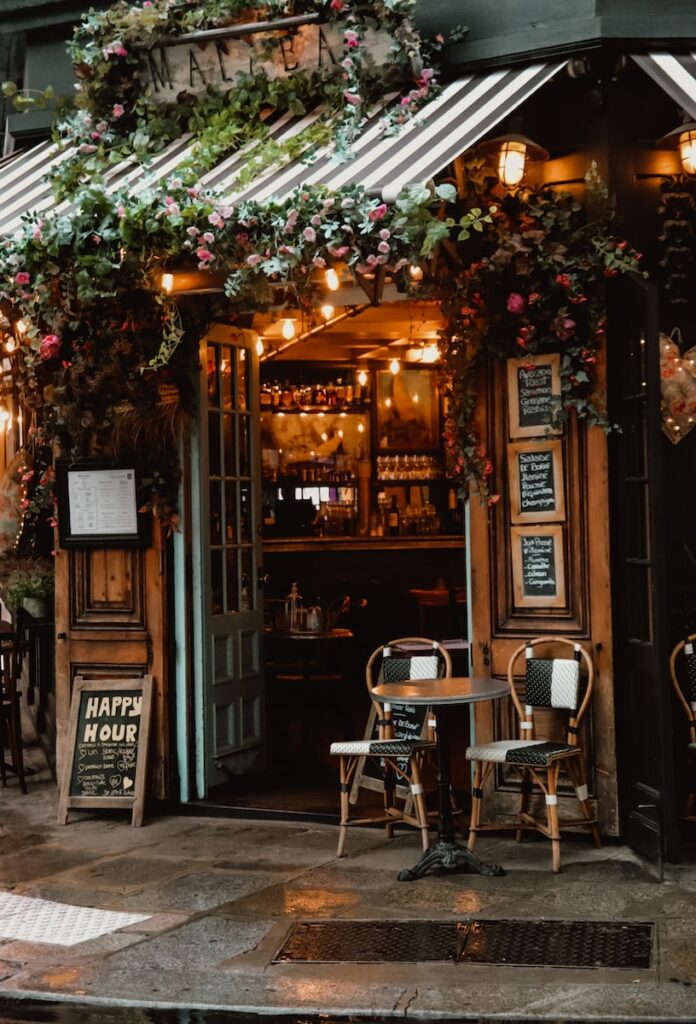Expats in Paris: Everything You Need to Know
Eager to join all the expats in Paris? In this guide, we’ve unpacked and explained everything you need to know!
Among the top places to live in Europe, Paris is one of the world’s most popular choices for embarking on an exciting new life.
The metropolitan part of the city has a sprawling population of around 11 million… while the city itself has around 2.2 million inhabitants.
But importantly for you, an estimated 20% of these inhabitants are non-natives. So if you join the expats in Paris, you definitely won’t be alone—because there’s such a diverse range of people here, you’ll always be welcome, and you’ll always find someone from your pocket of the planet.
But if you’re gonna make the big move, finding friends isn’t enough… and there are lots of things you need to know.
So in this fact-filled fun-fest, your reliable relocation experts here at Homelike have come to help you out. We’ve covered pros, cons, restaurants, parks, nightlife, language learning, where to live in Paris as an expat, and much more.
Want to know if expat life in Paris is for you? Grab yourself a croissant, and come join the joie de vivre!
Pros and cons of being an expat in Paris
Pros of living in Paris:
- It’s Paris!: is there anything more archetypally romantic than living in France’s capital? Fleeing here to find a new life is a cliché for all the right reasons.
- Fantastic food: perfect for greedy gastronomos, Paris (as you probably already know) is one of the most food-tastic cities on the planet. Expect excellent French fayre, many independent stores and eateries, and food from around the globe.
- Fantastic public transport: but more detail coming up soon…!
- Endless activities: Paris has countless things to do (for tourists, locals, and long-term expats). Expect galleries, museums, historical sites, day trips, cycle trips (both in the city and beyond!), partying, interesting venues, and lots of events and festivals.
- You’ll make lots of friends: as we’ve covered, there are many expats in Paris. Add this to big packs of short-term tourists, friendly locals, and many remote workers, and you have a tasty recipe for a thriving social life.
- Fresh produce: most large cities have been swallowed up by globalization… and mainly just feature a big bunch of supermarkets and other chains. But in Paris, people still buy food and drinks from local bakeries, local stores, and local grocers.
- It’s hyper-modern: this won’t surprise anyone, but Paris is one of the most modern cities in the world. Expect lots of conveniences, lots of great schools and hospitals, excellent infrastructure, and many great city-center perks.

Cons of living in Paris:
- It’s pricey: we’ve covered some particular costs soon. But Paris is one of the most expensive cities in the world. It’s therefore not great for every budget—but if you can afford an existence here, expect an excellent quality of life.
- Sometimes-subpar weather: many would-be expats in Paris seem to have some strange idea that Paris is constantly sunny (we blame all those cheery French movies). But sometimes, the city can be gloomy, gray and rainy.
- The difficulty of finding a place to live: for expats in Paris, this is usually the most troublesome part of living in the city. Don’t expect to easily or quickly find a nice place to live—it’s often easier to instead move into a furnished apartment in Paris when you first arrive.
- Tons of traffic: as one of the expats in Paris, this might not affect you too much (most foreigners exclusively use public transport). But if you’ll be driving, or if you’ll be using lots of city-center buses, you should be prepared for lots of traffic.
Dirt and grime: Paris is a lot dirtier than most people anticipate. It’s not outrageously bad, but it might not be as clean as you’re expecting.
Public transport in Paris
Paris’ public transport system is excellent—and expats in the city probably won’t ever need access to a car (unless they’re venturing to other parts of France).
The network is made up of metros (16 lines and 300 stations), trains (5 lines), trams (4 lines) and buses (64 different routes).
The public transport system is split into six different zones. The central parts of the city all lie within zones 1 and 2… but exactly where you’ll be venturing of course depends upon where you’ll be living and working.
Expect to spend most of your public transport time on the metro. It’s the best, fastest, and most extensive part of the city’s public transport—and it’s of course highly popular.
If you’ll be staying in Paris long-term (which you probably will be, since you’re reading this guide!), you should get your hands on a Passe Navigo, which you can use on all forms of motorized public transport. You must first purchase your card (for €5), before then repeatedly activating it (either weekly or monthly).
There are various prices according to pass duration, and how many zones you’ll be traveling within. But the most expensive (unlimited travel within zones 1 to 5 for an entire month), costs €75.20 (which is a pretty good deal if you’ll be using it a lot).
Paris is also home to a city-wide bike-sharing scheme (this was actually one of the first schemes of its type on the planet!). You’ll find these bikes placed throughout every part of the city—so you can absolutely use these as your sole method of transport if you wish.
Although Paris isn’t the most cycle-friendly city on the planet, it’s getting better all the time. The mayor is always working to develop new cycle lanes, new cycle infrastructure, and more car-free zones.

Opening a bank account for expats in Paris
You don’t need a French bank account for tackling expat life in Paris. But if you’re gonna be paying bills, living in the city long-term, or working in the city, you’ll definitely struggle without one.
To open a bank account, you’ll usually need to provide these documents…
- Some ID
- Your proof of address (such as a utility bill)
- Proof of income (no matter whether you’re self-employed or traditionally-employed)
- Your residence permit, which you need if you’ll be in France for longer than 3 months (you get this after you arrive in France, and should apply for it as quickly as possible)
Expats in Paris can either get a traditional in-branch bank account, or an online-only account.
The best and easiest in-branch option is to open an account with an international chain, such as HSBC or BNP Paribas—these banks have branches in Paris (and throughout France), and they might also have branches in your home country. HSBC is a particularly good choice as you can tackle the entire account-getting process in English.
… and if you choose an international bank, you can sometimes organize and set up your account before you even move to Paris.
All of that said, it’s often best for foreigners to open an online-only account with an online-only bank. These banks offer no in-branch support, but they have quick sign-up processes, and they’re simple and stress-free. France’s best online-only banks include N26 and bunq.
As a compromise, consider opening an account with Crédit Agricole. One of the biggest banks in France, they offer physical branches, but they also offer swift sign-up processes.
Best neighborhoods to live for expats in Paris—where to live in Paris as an expat
When you’re working out where to live in Paris as an expat, here are some of your best options…
- The Latin Quarter: stacked with tourists, students, and young professionals, this place offers a magnetic mix of many types of excitement. You’ll find lots of places to eat, drink and party, many independent venues, and some pockets of surprisingly-affordable fun.
- Quartier du Gros-Caillou: this neighborhood is great for many types of expats. Short-termers love the Eiffel Tower and the museums. Young people like the bustle. Families like the green spaces, the parks, and all the useful conveniences.
- Le Marais: popular among classy expats in Paris, this central district is decked out with pricey boutiques, sleek bars, and lots of art and culture. If you like an elegant atmosphere, you’ll love it. If you don’t, you might find Le Marais a little aloof.
- Saint Germain Des Pres: sitting right beside the Seine and the Louvre, this is another central solution. Once the literary epicenter of the city (Oscar Wilde and others used to live here!), it’s now known for food, shopping, and lots of class and culture.
- Montmartre: if you want to feel like you’re living in some whimsical 60s French movie, head here. Expect ivy-strewn houses, cobblestoned streets, lots of beautiful architecture, and a very arty atmosphere. It’s not as budget-friendly as it once was, but it is incredible.
- Bastille: offering a lovely balance of old and new, this historically working-class neighborhood has been recently gentrified (but not in a pretentious way). It’s great for finding affordable housing, multicultural buddies, and friendly life-long locals.
- Menilmontant: one of the best options for budget-conscious expats in Paris, outskirt Menilmontant was once a separate hamlet. Long since eaten up by the city, it offers low-price apartments, a welcoming community, and a vaguely village-like feel.
For lots more information on all these districts (and others!), wander over to our detailed guide on all the best neighborhoods to live in Paris.
How to find apartments in Paris
For expats in Paris, this is usually one of the most frustrating parts of living in the city.
Every day, people in Paris are looking for a new place to live… so you have lots of unhelpful competition. You’ll likely need to wait and negotiate for weeks at a time, viewing many properties, discussing possible prices, and even outbidding other potential tenants.
To make things even more complicated and mind-boggling, Parisian landlords often need you to provide a French guarantor as part of the contract-getting process. And there’s little chance you’ll have one of those.
So expat life usually becomes much easier if you move into a short-term rental in Paris instead. With one of those fully-furnished options, you don’t need to deal with local landlords, you don’t need to spend endless weeks viewing potential properties, and you don’t need to waste time, money, or energy.
(If that sounds like a simple solution to your problem, we have lots of great options on our site. And if you’re specifically looking for studio apartments in Paris, pet-friendly apartments or luxury apartments, we have plenty of those too!)
That said, it’s absolutely possible to find a home in the traditional way—you just need to be very patient! If that’s your plan, the best (and most popular) real-estate websites are pap.fr and fusac.fr. But be swift—the good homes go quickly, and often only the shoddy places remain.
Facebook is another good home-hunting resource for expats in Paris—and if you don’t speak French, it’s your best online option. You’ll find lots of groups (such as this one and this one!) where you can hunt for potential homes.
For a brief breakdown of our favorite homes in the city (along with some useful maps!), check out our guide to all the best apartments in Paris.

Best areas for restaurants and bars in Paris
One of the best parts of expat life in Paris is all the drinking and dining. The best neighborhoods for sipping and chewing include…
- Montmartre: can there be anything more romantic than munching meals on a cobbled side-street among the maze-like lanes of Montmartre? You get traditional brasseries and bistros (such as Le Cabanon de la Butte and Le Poulbot), along with trendy brunch spots (including The Hardware Sociéte and Maison Milie).
- Oberkampf: if you’re keen to avoid the tourist hordes without venturing from the center, hip and happening Oberkampf is a great solution. One of the city’s liveliest and trendiest neighborhoods, you’ll find cool bars, cheap eats, and a whole load of friendly faces. Head to Mobster Bar and Restaurant Massale.
- The Asian Quarter: for diversifying your diet during expat life in Paris, this should be your first stop. A large portion of Parisian food is (obviously!) proudly French, but this area serves up endless Asian fayre. Expect Chinese, Vietnamese, Thai, Laotian and Cambodian food (and people). Top spots include Basilic & Spice, and Chez Yong.
Best areas for Paris nightlife
Lots of expats in Paris love the city’s nightlife. If you want to join them, the best districts are…
- Le Marais: Hugely popular with LGBTQI expats in Paris, this welcoming area is packed with places to drink, dance and party. Some of its top hangouts include 3-floor Yono Bar (often unhinged, always busy, and offering tempting drinks and DJs), strangely-named FAT, and dimly-lit Little Red Door.
- The Latin Quarter: imagine all the drinking-in-Paris clichés you’ve ever conjured up. Now imagine they’re all squeezed into one space: that’s the Latin Quarter. Expect al-fresco slurping, charming riverside terraces, lots of cobbled lanes, and many laid-back bars. Start with Baba Yaga, and elegant piano bar Café de Paris V.
- Sorbonne: for young expats in Paris, this is among the best spots for drinking and dancing. A small part of the Latin Quarter, it’s close to a main university campus—and it’s packed with cheap venues, dive bars, and cut-price drinks. Two favorites include the strange fun of Teddy’s Bar, and the knockabout ruggedness of Le Piano Vache.
Best parks in Paris
The city is home to around 450 parks and gardens—and one of the best parts of expat life in Paris is lazing and lounging around in them all. Highlights include:
- Jardin du Luxembourg: one of the most iconic parks on the planet, this place dates back all the way to 1612. In it, you’ll find lots of landscaping, a huge amount of kid-friendly stuff, and many chess games. It’s vaguely formal, but still very welcoming.
- Jardin des Plantes: the city’s botanical garden, this huge complex features over 10,000 floral species, a small zoo, a maze, lots of themed areas, and a strangely dreamlike vibe.
- Parc de la Villette: if you like laid-back green spaces, this is the park for you. It offers play spaces, outdoor movie screenings, performance art, lots of families, and lots of strange architectural structures. It’s a big favorite among expats in Paris.
Expat forums in Paris, and expat groups in Paris
Because so many other foreigners live in the city, expat life in Paris can be massively rewarding.
You’ll quickly find lots of friends, and you’ll quickly find people who are interested in whatever you’re interested in. Because Paris is so big and so diverse, you can explore all hobbies and interests here… and you can usually find other people to explore them with.
Facebook is your best resource for meeting other expats in the city—on the platform, you’ll find lots of expat groups in Paris and expats forums in Paris. For finding friends and other people to spend time with, this group, this group, and this group are all great.
And for finding events, this group is a pretty good place to start.
Couchsurfing (as always!) is another good resource. On the platform, you’ll find lots of friendly faces in the city, ranging all the way from lifelong locals to short-term tourists.
Learning French for expats in Paris
Many expats in Paris make no effort to learn French—and those people can still have a fulfilling and exciting life in the city. Lots of Parisian people speak English, and lots of menus, signposts and public transport markings are written in both French and English. So you absolutely don’t need to learn French to live in the city.
But you’ll have a much more interesting and immersive life if you do learn French. Expat life in Paris is great; but expat life in Paris when you know French is really great. With French skills, you’ll make more friends, you’ll better enjoy ‘normal’ things (like shopping, taking public transport, and ordering food), and you’ll be able to successfully interact with everyone in the city.
Best of all, learning French means you won’t find yourself stuck in an expat bubble (which always happens if you don’t know any nation’s local lingo).
Of course, whether or not you’ll want to learn also depends upon how long you want to stay. If you’re gonna be in Paris for 6 months, you probably shouldn’t bother learning French. If you’ll be there for 6 years, you probably should.
If you do want to learn French, start with trusty ol’ Duolingo (which is excellent for the basics). When you feel ready to move on to something more challenging, you can venture to one of the city’s many language-learning centers.
Good reads on living in Paris
France’s capital is one of the most written-about cities on the planet.
So in preparation for expat life in Paris, you might want to read about the place.
If you’re only gonna be around for a short while (and behave like a long-term tourist), you might want to get a copy of Lonely Planet’s most recent guide to the city.
For something a little more practical and helpful for long-term life, David Hampshire’s guide to Living and Working in France has some excellent borne-from-experience tips and hacks.
For some laughs, we recommend the journals of Stephen Clarke (Paris Revealed and A Year in the Merde). And for other personal stories (though serious rather than laugh-worthy), check out Janice MacLeod’s lengthily-titled A Paris Year: My Day-to-Day Adventures in the Most Romantic City in the World.
Blog posts and websites are of course another good option. This Paris-centric blog is stacked with a whole range of different stuff (and even offers a newsletter!) while here’s a great guide on staying safe in the city.
And last of all, here are some top travel hacks for Paris, and 16 things you need to know about moving to the city (yep, you’re right… we wrote those last two articles ourselves. But let’s not get hung up on the details—we’re just here to help!).
Cost of living in Paris
When you join the expats in Paris, these are the types of expenses you can expect to encounter…
- 1-bedroom apartment in the city center: €1,257
- 1-bedroom apartment outside of the city center: €945
- 3-bedroom apartment in the city center: €2,867
- One-way ticket on local public transport: €1.90
- Regular monthly pass for local public transport: €75
- Meal for 1 at an inexpensive restaurant: €15
- 3-course meal for 2 people at a mid-range restaurant: €60
- Large draught domestic beer in a bar or restaurant: €7
- Regular cappuccino in a cafe or restaurant: €3.68
- Regular liter of milk from a supermarket: €1.20
- Loaf of white bread from a supermarket: €2
- 12 regular eggs from a supermarket: €3.45
- 1kg of chicken breast filets from a supermarket: €12.14
We’ve taken all the above figures from the stat-loving team over at Numbeo.
The trash disposal system in Paris
For expats in Paris, this can be a little confusing at first. But once you get used to the system, it’s all pretty simple.
Trash is collected in Paris several times per week (sometimes daily, sometimes twice a week, sometimes according to some other schedule).
The exact schedule will depend upon exactly where you live—and so too will the exact location where you need to leave it (it might be your doorstep, or it might be a shared common area). You can leave this trash in a black bin liner, or in a green bin (the latter of which you can order from your nearest city hall).
For helpful schedules, download Uzer—it offers specific trash-collection times for all parts of the city.
But before you leave out your trash, you’re expected to sort and organize it, in order to make sure you’re not leaving any recyclables behind.
For disposing of all your recyclables, you’ll need to find your nearest color-topped bins. They’re common throughout the city, so you should find one very close to where you live*. You place cardboard, paper, plastic and metal into yellow bins, glass into white bins, and clothes into specific textile-collection bins.
You should place food waste, garden waste and other green waste into the brown-topped bins. You can either choose one of the bins located in the city, or you can order your own personal brown bin.
*If you don’t have any of these recycling bins close to your home (though you most likely will!), you can request a personal version from the city hall.
Expats in Paris: final thoughts and further reading
And just like that, we’ve explored our way to the end of this guide on expat life in Paris.
Again, if you’re looking for the convenient time-saving solution of a serviced apartment or a serviced flat in Paris, we have many options on our site. They’re all cozy, welcoming, well-located, and fully-furnished—and they’re all ready to be your home today.
And for exploring other parts of France (who knows where you might want to live next!), we also have helpful guides on Toulouse, Marseille, and Lyon.
Thanks for reading, thanks for choosing Homelike, and we’ll hopefully see you in Paris.






















